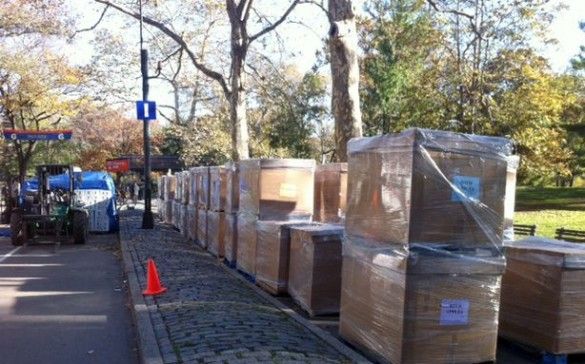Valuable Resources Pegged For Marathon Stranded In Central Park

Mayor Bloomberg’s decision to cancel the New York City Marathon may have been the right one, but his delayed action in doing so has shown to have further repercussions than merely inconveniencing thousands of runners who dropped thousands in travel expenses, or even the expected $340 million dollars in revenue that the marathon brings to the city each year.
Scores of generators, blankets, food, water, and clothes were all left stranded in Central Park, far out of the reach of people in desperate need of emergency supplies, including many in Sheepshead Bay, Manhattan Beach, Brighton Beach, Gerritsen Beach, Coney Island and Sea Gate.
The city had been preparing for the marathon full speed ahead, until Bloomberg cancelled the event at the last minute. According to a report in the Post, “[T]he city left more than a dozen generators… 20 heaters, tens of thousands of Mylar ‘space’ blankets, jackets, 106 crates of apples and peanuts, at least 14 pallets of bottled water and 22 five-gallon jugs of water” in Central Park in preparation for the big race.
Blame for the reasons as to why these precious resources were left in Central Park instead of servicing disaster victims was evenly spread.
“Once we found out they’d still be running a marathon, we had to call all the towing vendors and tell them they couldn’t come,” a Central Park security guard told The Post, effectively blaming the runners’ desire to hold an impromptu makeup race in lieu of the real thing.
Runners blamed the city for not taking action.
“I’m sure they could have asked the runners to pause to remove the things,” runner Scott Hawley told The Post. “It shouldn’t take long, and if any of us knew this, we would want that to be the priority.”
The city, for its part, blamed the company that owns the generators.
“We reached out to all vendors but many were unable to fulfill our requests due to lack of large generators, lack of trucks and lack of personnel,” said Bloomberg aide Julie Wood. She also claimed that “many of the generators being used for marathon events are not the types of generators most in need for hard-hit areas in New York City. Their power output does not match the levels we are looking for.”
Bloomberg himself seemed unsure on the reasons as to why the valuable resources were left in Central Park and insisted that the stranded Central Park supplies were “not a story.”
While the reasons the city provided might all be valid, the “pass the buck” mentality surrounding the issue seems to reflect the overall stalling involved in Bloomberg’s delayed reaction in cancelling the marathon, a decision that seemed like a no-brainer for the millions of New Yorkers living without adequate power, heat, food, and other essentials.



